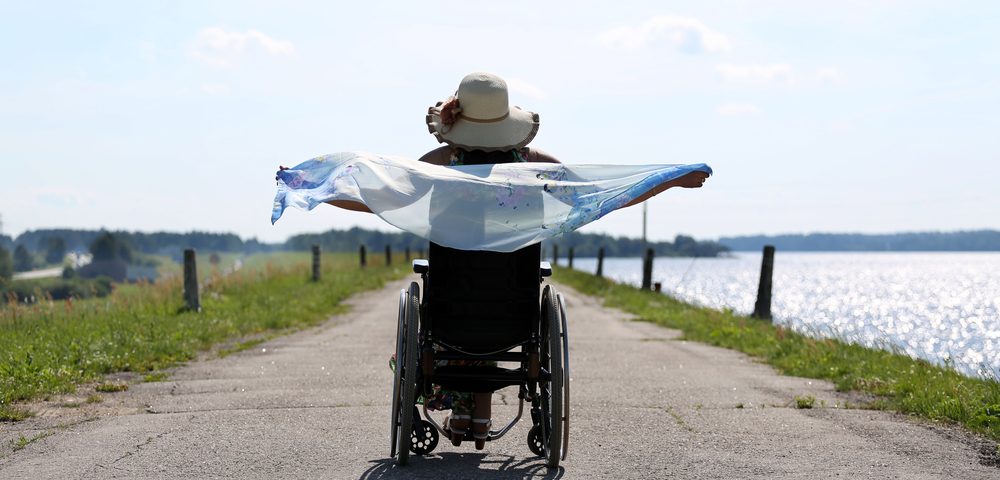Trailblazing Toward a More Inclusive World
Written by |

I recently spoke at an event called “OutWiGo Girls” for the Wisconsin Department of Natural Resources in the enchanting woodland area of Kettle Moraine State Forest.
Held in celebration of gals of all ages who share a love of exploring nature, the event’s agenda revolved around an array of outdoor topics. There were scheduled speaker sessions throughout the day and interactive activities such as guided hikes, paddling, campfire cooking demos, backpacking demos, and horseback riding.
As an adaptive recreation enthusiast and accessibility advocate, I represented the wide demographic of people with mobility challenges who navigate the outdoors in a creative way and who need to consider accessibility issues when planning for travel and leisure. When I talk to people about these topics, I feel alive and bright. I beam at the opportunity to educate others about accessible recreation options in Wisconsin. My heart feels uplifted by empowering others to live fully through accessible adventures.
However, much as I enjoy speaking on these topics, as the day approached my nerves began to fray. When I thought about intertwining a lengthy speech with my SMA, anxieties mounted in my mind. What if the fatigue monster creeps up behind me and I poop out halfway through? What if I can’t sufficiently project my voice? What if no one is interested in accessibility and the audience perceives my session to be a total snoozefest?
I wondered if Spinraza (nusinersen) would swoop in and make an appearance. I decided to breathe and roll with it — one wheel revolution at a time.
My friend Sarah was my caregiver for the day. Our friendship took root almost two decades ago when she was assigned as my counselor at MDA Summer Camp. Each summer, we’d create fond memories of our shenanigans together. Even early on in our budding friendship we were as thick as thieves. Sarah became one of my regular caregivers during our early college years. Although life has taken us in different directions we plan adventure days together from time to time. Catching up and reminiscing with her on the three-hour drive to the event was a welcome distraction from my nerves.
The afternoon temperature topped out at a brisk 53 degrees. Bundled in several layers, I listened to a speaker describe her experience of paddling the entire Wisconsin River in 18 days. I love listening to others’ stories, and I was ready to bridge a gap by sharing mine.
Within the modern park shelter, ample acoustics elevated my voice and sent it drifting toward all of the ears gathered around me. I turned my speech into a discussion-led session. Framing my background, I explained what SMA is, how it imposes limitations on my life, and how I’ve risen above some of those challenges. I shared my “trail story” from childhood, detailing a path I was allowed to explore by myself and how my parents must have figured that the worst that could happen is I’d encounter a bear, and they were confident in the speed of my wheelchair to outpace it. As laughter billowed toward the high ceilings, I suddenly felt mellow.
I took brief breaks by asking and taking questions from the audience. As I paced myself, I noticed a surge in my speaking endurance compared to my pre-Spinraza days.
Once I’d outlined my mobility challenges, I shed light on some of the most accessible outdoor adventures I’ve experienced over the years. I discussed ADA lodging and gave examples of how accessibility is not a one-size-fits-all topic but depends on a person’s specific situation. I explained why accessibility is an important issue to me and how it helps to build a more inclusive world. I described how my connection with nature and adaptive recreation has helped me to cope with my SMA. I offered my personal philosophy of adventure and how growth in accessibility resources would positively impact those who live with mobility challenges throughout all stages of life. Accessibility isn’t a topic that people often think about unless their lives are touched by it, and I believe it’s important to put a relatable spin on it — that way, others tend to be more receptive to learning about it.
After I’d spoken, connecting with people was refreshing. Some wanted to discuss a particular topic in more depth, while others shared how they’re affiliated with accessibility needs advocacy throughout Wisconsin.
As the sun hung low in the sky that evening, my heart was grateful for how the day unfolded and for the noticeably positive effects I’ve had with Spinraza. I may have lived with SMA my entire life, but my diagnosis hasn’t meant that my life is over. Instead, it’s provided me with an opportunity to leap beyond the boundaries of ability.
***
Note: SMA News Today is strictly a news and information website about the disease. It does not provide medical advice, diagnosis, or treatment. This content is not intended to be a substitute for professional medical advice, diagnosis, or treatment. Always seek the advice of your physician or other qualified health provider with any questions you may have regarding a medical condition. Never disregard professional medical advice or delay in seeking it because of something you have read on this website. The opinions expressed in this column are not those of SMA News Today, or its parent company, Bionews Services, and are intended to spark discussion about issues pertaining to spinal muscular atrophy.




Leave a comment
Fill in the required fields to post. Your email address will not be published.